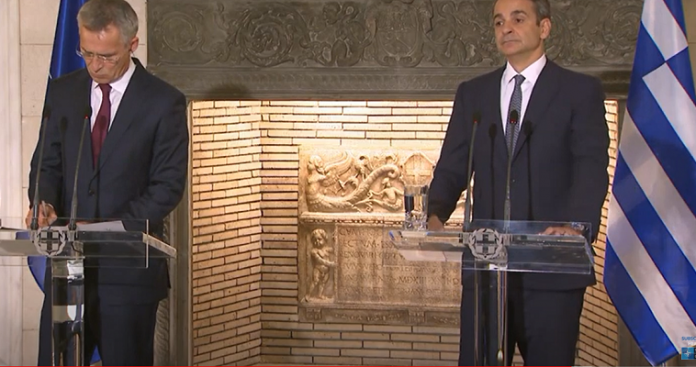Alexandros Mallias: What not to expect in Greek-Turkish relations from EU and NATO
25/09/2020
Where are we today? I dare say that especially in the current phase of the fundamental revision of the balances in international relations, deregulation of interests and rearrangement of alliances, Greece must be able to stand on its own, if necessary. In Evros and now in the Aegean we have proved that we can do it when there is the political will. Also, when the will is accompanied by the admittedly exemplary operational and opportunities in the field.
Any thought of isolationism today would amount to a major blow to our credibility and capabilities and would certainly lead to national weakening. The stabilization and recovery of the economy and the return of Greece to the category of “normal” countries is imperative and has already been launched. This is the main pillar, the unconditional term, for the prospect of recovering lost time and space and for promoting national security.
The economy is the fundamental pillar of national power and security, enabling us to pursue a convincing and effective foreign policy and a strong deterrent policy. Some, within the country, even today find it difficult to perceive and embrace reality. Today, Greece needs political time. Our participation in the EU, the greatest achievement of modern Greece, is undoubtedly a guarantee. It is in our hands and in our will to always take advantage of this great potential.
Relations within the EU and NATO are ancillary to Greek efforts
Alliances and partnerships of all kinds and forms (EU and NATO) are good and necessary. However, they are only ancillary. Especially in relation to NATO, given that the threat comes from Turkey, a member state of the Alliance. The government and the political forces as a whole have already come to conclusions from the recent artful “neutrality” of some partners in the EU and our allies in NATO.
Let us clarify, however, that Turkey is alone – completely alone in fact – with fewer and fewer friends and allies compared to Greece. I believe that we have drawn some useful conclusions about how a number of our partners and allies have reacted throughout this period of confrontation between the armed forces of Greece and Turkey in the Aegean. In the world we live in today, let us realize that no one – at least to the extent that we hope – will automatically turn to help us. This conclusion does not only concern Greece.
The well-known understanding since 1974 that NATO is reluctant and unable to prevent, to deter aggressive actions between two of its members is constantly confirmed. Protecting our borders, then, is solely our primary duty. This does not mean that Greece does not need friends and allies on the basis of shared values and mutual interest. I insist, however, on the proposition of interest, because the commitment to a common scale of values is rather theoretical and occasional.
In this phase we have France by our side. Its alliance with Greece and Cyprus was undoubtedly not only for reasons of principles – although they are not lacking – but because this was imposed by the French interests in our region. I reserve the right to note that the motivation due to interest is more permanent and stronger than that of principles, which are increasingly rare on the world chessboard.
Belarus and Turkey: Two different standards
I am closely following what is happening around the imposition of sanctions on dictator Lukashenko in Belarus. Many EU member states have a different perception from that of Greece and Cyprus. They see Russia as the main threat to their national security. Despite the positive moves and diplomatic efforts that Athens has been systematically making in recent years and the unprecedented – in my opinion correct – defense cooperation with the United States, several partners and allies believe that Greece pursued a clever policy towards Russia. They mainly refer to the pro-Russian attitude of part of Greek public opinion and the media that manifested itself in the case of the violent and illegal annexation of Crimea.
However, they painlessly bypass their own reluctance to take a stand against Turkey today and take drastic measures against it. This is despite the fact that this is not a theoretical threat, but a gross violation of international law and a violation of the sovereign rights of two Member States, Cyprus and Greece. Some of our partners and allies are reluctant to take a united stand now and take drastic measures (sanctions) against Turkey.
Far less so, to take measures to overthrow Turkish “faits accomplis” in order to return to the status quo ante. That is, the withdrawal of the Turkish occupation troops from Cyprus. It would be naive to believe in automatic reactions that will come from the EU and NATO on issues concerning the security of Greece and Cyprus. Of course, exceptions may occur.
The US and alternatives
The US security interest in the wider Eurasian region requires – albeit without enthusiasm – cooperation with Erdogan’s Turkey. Washington will do everything in its power to prevent Turkey from falling completely and irrevocably into Russia’s arms. Greece and Cyprus, however, are now literally able to make the most of the reasoned US willingness to provide alternatives in a timely manner. In the defense and operational sector and beyond.
Regardless of President Trump’s personal relationship with President Erdogan, US initiatives in the Middle East strengthen Greece’s hitherto unimaginably strong partnership with a number of key countries, including Israel, Egypt, the United Arab Emirates, and Saudi Arabia.
A few days before the Turkish hybrid attack on Evros took place, we heard from well-known Athenian rumor-monger that Turkey was not a threat. Also, that we Greeks are maximalists, followers of diplomatic immobility and phobic. With what has happened in recent weeks (we are back to the brink of military conflict), it has once again become apparent that these views are characterized by a lack of strategic vision by Turkey. Mostly, they show a naive lack of realism. At the very least.
Four conclusions
- The excellent performance of the armed forces in the Aegean and the Evros and their successful operational action is ultimately the primary and main reason that opened a window for the fold-back – at least tactically – of Turkey. Erdogan realized that he could not achieve his goal without unbearable and for the same personal cost.
- At the same time, diplomatic mobility with Egypt, France, Israel and the United Arab Emirates has expanded the scope of deterrence against Turkey.
- Now, if politics allows us the time we need to strengthen the equipment of the armed forces and their operational capabilities.
- The main concern is to avoid creating bad precedents and even more Turkish political-diplomatic faits accomplis.
At the moment, it is particularly necessary to strengthen the Cyprus-Greece-France front and to preserve unity both within the government and within the political world. It does not make sense these days to be overwhelmed by rumors of disagreements. We can not lose in a few days what, as we all believe, we have achieved since March.
I interpret this – perhaps arbitrarily – as the main message of the telegraphic circular of Admiral Lyberis: “The certainty that these waters are ours and will remain so, was confirmed by your attitude. Now is the time for the rest to step up. Keep notes of what you learned from the process. When you need it, you know how it’s done. And it will be needed. ”
He who is able to understand, will understand.





